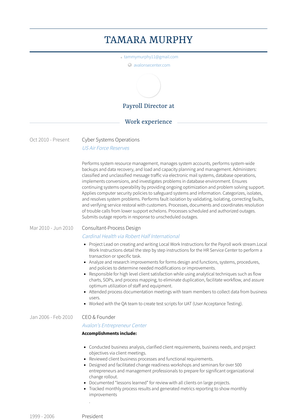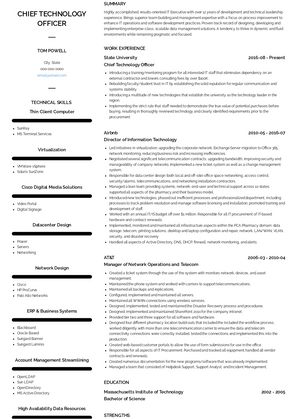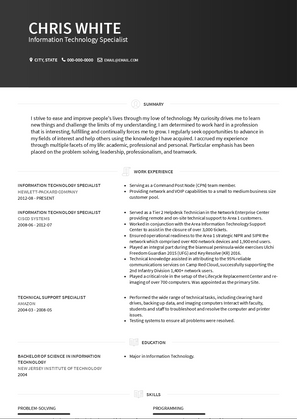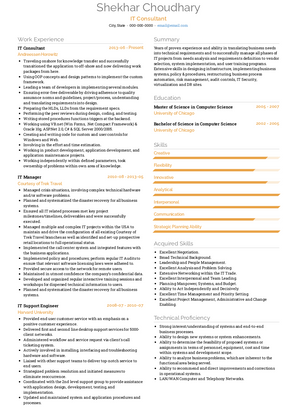Cyber Security Resume Examples + Samples for 2022
This page provides you with Cyber Security Resume Examples + Samples for 2022 resume samples to use to create your own resume with our easy-to-use resume builder. Below you'll find our how-to section that will guide you through each section of a Cyber Security Resume Examples + Samples for 2022 resume.




Overview
Information technology and computing are crucial parts of any business. However, as these amazing technologies become more essential to the way we work, they become greater targets for exploitation and attack. If you have the skills and expertise needed to combat threats from hackers, scammers and viruses, you could find a lucrative and rewarding career in cyber security.
According to the US Bureau of Labor Statistics, cyber security is a fast-growing industry – in fact, job growth for cyber security analysts is estimated at an amazing 35% over the next decade. Even better, you can expect to be paid well for your skills! The median annual wage for cyber security professionals reached $102,600 in the year 2021.
Needless to say, these amazing prospects make cyber security roles intensely competitive. Plus, because cyber security is so important to businesses, they hold all potential applicants to high standards. To help you get a head start, we’ve written up this guide to building the best possible cyber security resume – regardless of your level of experience.
We’ve written up some example resume sections, some tips about what to do (and what not to do) when writing your resume, and some advice on how to navigate the application process. Read on, and you’ll be building your first resume in no time!
What is Cyber Security?
Cyber security is all about protecting the integrity of an organization’s digital infrastructure. Cyber security professionals don’t just deal with security threats or incidents when they arise. They also work proactively to defend against digital attacks and interruptions, to minimize the risk presented by cyber security threats.
Perhaps unsurprisingly, some businesses have a greater need for cyber security professionals than others. Usually, cyber security jobs are more prevalent in industries that deal with sensitive personal or financial information. Some common fields where cyber security professionals work include:
- Banking
- Consulting companies
- IT and tech companies
- Government departments
- Insurance companies
Most cyber security professionals have at least a bachelor’s degree in a relevant subject – typically something relevant to computing. It’s also common for employers to prefer candidates with relevant certifications in cyber security. This is particularly true if you don’t have any prior work experience in the cyber security field!
It goes without saying that working in cyber security requires an in-depth knowledge of computing and IT – particularly the areas that relate to security – as well as an understanding of security more generally. You’ll need to be able to communicate effectively with other people, in order to explain your security policies and secure their buy-in and participation. And you’ll need to demonstrate the problem-solving and planning skills that will allow you to prepare thoroughly for any cyber security threats.
How to Write a Cyber Security Resume
As an aspiring cyber security professional with no experience, your resume needs to demonstrate two things. The first is that you have the qualifications necessary for the role you want. The second is that you have all the skills you will need to do great work in the role.
When you don’t have much directly-relevant work experience, writing a resume can feel intimidating. But especially in the early stages of your cyber security career, your professional experience may actually be less important than your skills. Many recruiters say that they hire for computing-based roles like cyber security based on proven ability, rather than on educational or professional background.
As a rule, you should make sure that your skills and your qualifications are at the heart of your resume. But remember that getting a job isn’t the only way to build experience. In a field like cyber security, it can be helpful to build experience by working on personal projects – such as volunteer-based security work or ‘white hat’ hacking – if you aren’t able to find work in your field.
Generally speaking, a cyber security resume written by someone with little to no work experience should contain the following:
- A summary
- Your education
- Any experience you have, including any personal projects you’ve worked on
- Your skills, including any certifications you have
The Best Format for a Cyber Security Resume
The format of your resume dictates what recruiters will notice when they take their first look at your application. When choosing your professionally-designed cyber security resume template from our selection, remember that, and think about what you want your potential employer to see from you. In cyber security, that will usually be your skills – like the coding languages and software packages you’re familiar with – so you should consider a format that leads with that section.
This is particularly true when you have limited relevant work experience, because the section listing your past work experience may be a little sparse as a result. Later in your career, once you’ve worked in cyber security for a little while, you can consider choosing a format that balances your skills with your work experience.
It’s worth remembering that many companies use an applicant tracking system (or ATS) to sort through the resumes they receive. This helps hiring managers streamline their hiring process, which is great for them – but it means that if your resume doesn’t make it past the ATS software, it may never be seen by a person. ATS software usually looks for specific keywords based on the job description, so if you don’t pay attention to what the job description is asking of you, you risk losing out on the role before the hiring process has even begun.
ATS software can also be confused by intricate resume formatting. Luckily for you, all of VisualCV’s resume templates are designed to beat ATS software. Our templates won’t confuse ATS software, so you can stop worrying about your formatting and start fine-tuning the actual content of your resume instead.
3 Cyber Security Resume Examples
Most resumes open with a summary – so most recruiters will see your summary before they see anything else about you. A summary should be a short and concise description of your best qualities. It will need to reflect the requirements set out in the job description, too, so you won’t be able to use the same summary for every application you make!
As you won’t have much work experience to talk about, focus your summary on your skills and qualifications instead. When you’ve spent more time working in cyber security, you can focus on your past experience – along with the skills and qualities that experience proves you have – instead.
3 Cyber Security Resume Summary Examples
- Cyber security professional with volunteer experience in systems maintenance. Skilled in HTML/CSS, Python, Kotlin, and JavaScript. Familiar with basic security principles and driven to deliver great service.
- Aspiring cyber security analyst with a 3.7 GPA from Stanford University. Freelance white-hat hacker with experience in identifying and repairing security flaws across a range of systems.
- Recent graduate in Computing with a 3.8 GPA, hoping to build a lifelong career in cyber security. Proficient in JavaScript and HTML/CSS, with extensive knowledge of best practices in cyber security.
How Not to Write a Cyber Security Resume Summary
Remember, your summary needs to be clear, direct, and focused on what you have to offer an employer. It needs to explain clearly why you meet the requirements for the role you want. Don’t be too wordy or too personal – that belongs in your cover letter, not your resume summary.
If you’re really struggling with your summary, keep in mind that not all recruiters agree that you need one. It’s okay to leave it out if you aren’t sure how to get it right!
Don’t:
- I grew up with technology, and have always taken a keen interest in the digital threats we face as a society. Now, as an adult, I would love to translate that interest into a career in cyber security. I want to defend the way we live and work against malevolent actors at home and abroad.
Do You Need a Resume Objective?
Now that you know everything there is to know about resume summaries, it’s time to think about your resume objective.
Your resume objective should be even shorter than your resume summary! It should set out your career goals, such as the type of role or the industry that you’d like to work in over the long term.
If you’re applying for an entry-level role, or if you don’t have much work experience behind you, an objective can support your resume summary and make your application stronger. When applying for higher-ranking jobs, it’s usually safe to leave the objective out of the equation.
Cyber Security Resume Objective Example:
- Cyber security analyst with a BSc in Computing, seeking to build a new career in cyber security.
How to Describe Your Experience on Your Cyber Security Resume
Particularly when you work in a field relating to IT or computing, you should remember that not all experience comes from paid work! You may have volunteering or internship experience that could help you create a more substantial experience section. You may even have worked on computing projects in your own time, which could give you some immediately relevant experience for a job in cyber security.
If this experience has some relation to the job, you can and should include it on your resume! If in doubt, take a look at the job description, and see if your experience proves that you have a skill or quality required for the role.
Describe Your Experience Effectively
When writing about your work experience, make sure you write about what everything you did actually achieved. Remember, hiring managers want to see hard facts about your past successes. If you can show evidence that your work has yielded results, they will be more ready to believe that you can succeed again in a new role.
That’s why, wherever you can, you should point out the results you achieved in previous positions. If you have hard statistics, so much the better! But results can look like anything – faster completion times, satisfied customers, or even just praise from a manager or supervisor.
Do: Volunteer Cyber Security Consultant, Apple Grove Clinic | 2019
- Liaised with the client to identify cyber security concerns around their electronic medical records
- Used security expertise to update and secure their medical records database, ensuring compliance with HIPAA requirements
- Worked with the client over time to maintain the database, responding to any new security threats as appropriate
How Not to Describe Your Experience
Remember, don’t just write a list of the tasks you carried out! It’s important to show hiring managers that you could carry out those tasks well, in a way that yielded results. A list of your responsibilities without any context won’t tell them anything compelling about you as a candidate.
Don’t: Volunteer Cyber Security Consultant, Apple Grove Clinic | 2019
- Consulted the client
- Secured the database
- Maintained the database
How to List Skills on Your Cyber Security Resume
When listing skills on your resume, the job description for the role you’re applying for can be a useful guide. It will generally include a list of the skills you’ll need to have a chance at the role. But it’s important to note that recruiters will expect you to have certain skills as a matter of course – and they may not be listed as part of the job description.
For general information about skills on your resume, check out our resume skills guide here!
Top Cyber Security Resume Skills in Demand
| Hard Skills for Cyber Security | Soft Skills for Cyber Security |
|---|---|
| Technology skills | Communication |
| Security knowledge | Organization |
| Software development knowledge | Attention to detail |
| Analytical skills | Time management |
| Technical writing | Creativity |
| Mathematical skills | Collaboration |
| Planning skills | Leadership |
| Problem-solving | Training and coaching skills |
The Most Important Soft Skills for Your Cyber Security Resume
Hard skills are vital in cyber security – but that doesn’t mean you should neglect your soft skills when writing your resume. Soft skills can give you an advantage in every aspect of your professional life. Plus, for applicants without much work experience, soft skills can show an employer that you have what it takes to succeed in the role you want.
Here are some of the most important soft skills to include on your cyber security resume!
Communication
Being able to simplify and explain complicated information is a vital skill in cyber security. If you want to ensure the best possible buy-in to security practices from your colleagues, you’ll need the skills to help them understand why security matters. Strong communication skills will give you a real head start.
Organization
As a cyber security professional, your job will change from day to day. You’ll need to be able to plan and manage your time effectively in order to stay ahead of potential security threats. Organization is a major part of that, and being able to show your organizational skills will make your application much stronger.
Attention to detail
When it comes to cyber security, paying attention to the fine details could help you solve problems more quickly, or even prevent them before they arise. It’s important to be meticulous in a field that relies so heavily on addressing complex problems! Showing that you have a keen eye for detail will stand you in good stead with any employer.
Professional Certifications in Cyber Security
Certifications are a great way to prove that you’re willing to take the initiative when it comes to your professional development. They’re also excellent proof of your skills, which can give you a big advantage if you don’t have much past work experience. If you have the opportunity, we always recommend looking into certifications in your field – and cyber security is no exception.
Here are some of the most common entry-level cyber security certifications!
Microsoft Technology Associate (MTA) Security Fundamentals
Offered by Microsoft, this certification comes with the guidance that you should familiarize yourself with Windows Server and other relevant products before taking it on. If you have that experience, though, this is an accessible and affordable look at core cyber security principles.
ISACA CSX Cybersecurity Fundamentals Certificate
This certification is geared toward recent post-secondary graduates, making it a great first certification for real newcomers to the industry. It covers key topics relevant to anyone working in cyber security, including the principles of architecture; network, system, application and data security; evolving technology and security; and incident response.
CompTIA Security+
This certification is recommended for people who have already completed CompTIA’s Network+ certification. However, it is also a thorough qualification in information assurance and security, covering a wide range of topics. It’s also compliant with the requirements of U.S. Department of Defense Directive 8570.01-M, making it ideal for anyone who wants to work in cyber security for the federal government.
Cyber Security Salaries
Salaries in computing-related jobs tend to skew higher, compared to other industries. But exactly how much can you expect to make as a cyber security professional?
According to Indeed, cyber security salaries range from $64,774 to $142,151. The average base salary is roughly $95,956, before any benefits such as health insurance or 401K. And as you progress through your career, you can expect your salary to increase accordingly.
Final Thoughts
Cyber security is a fast-growing industry with a wide range of job prospects available. If you have the right skills and expertise, you stand a great chance of finding a role that will suit you. And with salaries erring on the higher side, you stand to benefit in a major way from applying your skills to the working world!
Remember, a VisualCV Pro membership can help you to earn the role of your dreams. Pro membership enables you to customize every aspect of your resume, so you can show hiring managers your very best self. Sign up today, and get a head start on your first role in cyber security.
Copyright ©2024 Workstory Inc.
